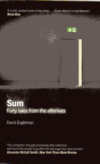Sum by David Eagleman
This is a strange little book, but in a good way. The author is described as "neuroscientist & writer" (find him on Wikipedia) but this is not about neuroscience. The book consists of 40 short pieces each describing a different imagined afterlife. No surprise, though, that none of them conforms to any of the mainstream religions’ views apart, arguably, from one where as a deceased human you have the choice of a new existence as another creature.
I don’t want to spoil your reading by giving too much away, but it might help explain the book if I give a couple of examples. In "The Unnatural", when you arrive in the afterlife the Technicians inform you that you can make any single change and then live life over again. Like the fairy’s three wishes this doesn’t turn out to be as great an opportunity as you might think and your attempt to improve things turns out to have unforeseen consequences. In "Spirals" you discover that your Creator is a species of small, dim-witted, obtuse creatures who built machines to work out the purpose of existence. Humans are those machines. What the Creators didn’t bargain for is that their machines took on a lfe of their own and became much more interested in building societies and interacting with each other instead of concentrating on answering the Ultimate Question (shades of Douglas Adams here), and the Creators are too dim-witted to understand any of this.
All together the book is a clever exercise of imagination – never flashy; gentle, often wistful. If there is a common thread or theme it is that we should value and make the most of our lives here and now in all their diversity, confusion and chaos, because whatever the afterlife (if there is one) may be, it’s likely to be very different from anything we might have expected, and won’t give us the same highs and lows, joys and disappointments that make up our lives in the present.

 Title: Sum
Title: Sum